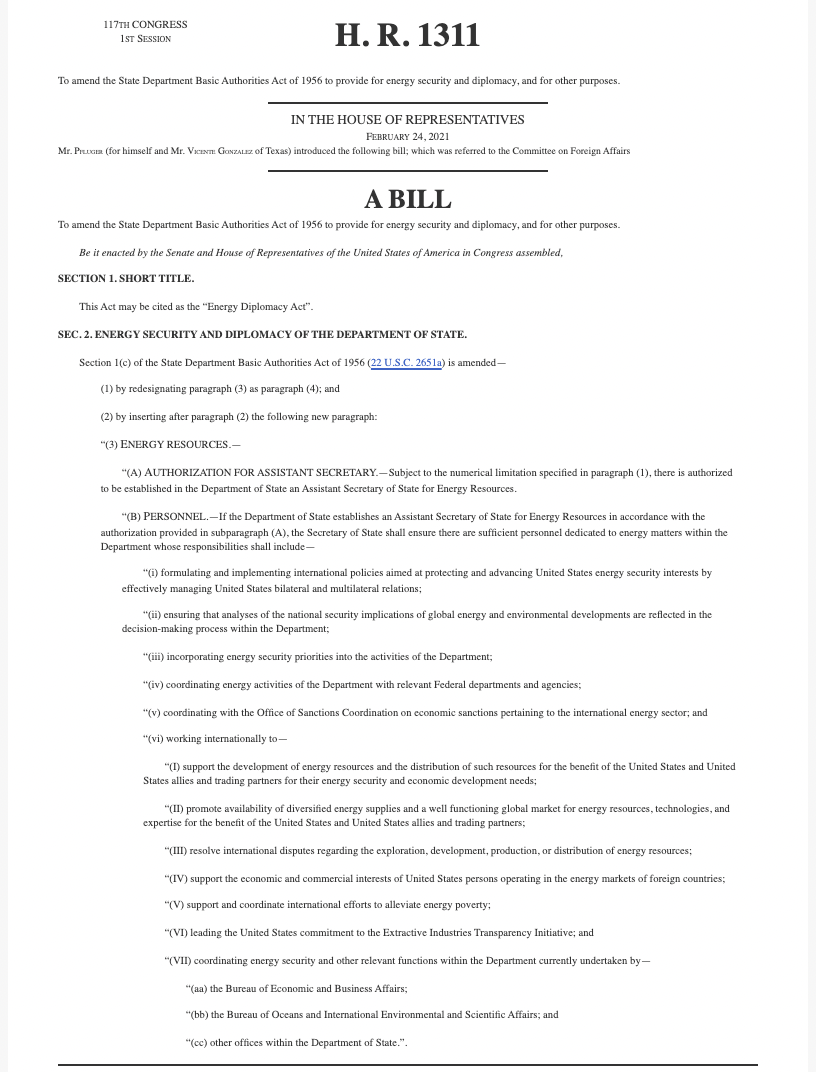S. 2373, the American Nuclear Infrastructure Act of 2021, and S. 1290, the STRANDED Act of 2021
Legislative hearing to consider S.2373, to reestablish United States global leadership in nuclear energy, revitalize domestic nuclear energy supply chain infrastructure, support the licensing of advanced nuclear technologies, and improve the regulation of nuclear energy, and S.1290, to assist communities affected by stranded nuclear waste.
Witnesses:- David A. Knabel, City Administrator and Director of Accounts and Finance, City of Zion, Illinois
- Armond Cohen, Executive Director, Clean Air Task Force
- Maria Korsnick, President and Chief Financial Officer, Nuclear Energy Institute
- Jeremy Harrell, Chief Strategy Officer, ClearPath Action
Climate Policy Network National Call

Want to learn about how climate policy campaigns are developing in states across the country – from Vermont to Nebraska to Montana to Hawaii? Have exciting climate policy developments to share with a network of like-minded individuals?
Join us for our monthly State Climate Policy Network national call! This one-hour, once-a-month call is the perfect opportunity to learn about the different legislation and movements going on in states across the US. Legislators, advocates, and experts will join us and inform the network of what is going on in their state as it relates to climate policy, and what you might be able to do to help.
For those of you joining us for the first time, the SCPN call is also an opportunity to simply listen to other states’ updates and challenges. We typically have campaign leaders and policymakers in 15-20 states calling in and providing updates, and dozens of people listening and asking questions on the line. The call is a great information-sharing and networking opportunity. Feel free to contact Kristen Soares, our SCPN Manager, at kristen@climate-xchange.org with any questions, or if you are interested in speaking on an upcoming call.
Disaster Recovery Assistance - Authorization of the Community Development Block Grant – Disaster Recovery Program
THE COMMITTEE ON BANKING, HOUSING, AND URBAN AFFAIRS will meet in OPEN SESSION, HYBRID FORMAT to conduct a hearing entitled, “Disaster Recovery Assistance – Authorization of the Community Development Block Grant – Disaster Recovery Program.”
Rescheduled from December 9th.
Witnesses:- Michael A. Sprayberry, Senior Advisor For Emergency Management, Hagerty Consulting
- Matt Mayer, President, Opportunity Ohio
Leveraging IIJA: Plans for Expanding Intercity Passenger Rail
- Stephen Gardner, President, Amtrak
- David Kim, Secretary, California State Transportation Agency
- Kevin Corbett, President and CEO of New Jersey Transit, Co-Chair, Northeast Corridor Commission
- Julie White, Deputy Secretary for Multimodal Transportation, North Carolina Department of Transportation, Commission Chair, Southeast Corridor Commission
- Donna DeMartino, Managing Director, Los Angeles – San Diego – San Luis Obispo Rail Corridor Agency
- Knox Ross, Mississippi Commissioner and Chair, Southern Rail Commission
Emerging Contaminants, Forever Chemicals, and More: Challenges to Water Quality, Public Health, and Communities
This hearing will examine various perspectives on emerging contaminants, so-called forever chemicals, and their impacts on public health and water quality. Specifically, the subcommittee will look at the growing concern in surface waters, their effects or potential effects on human and aquatic ecosystems, and the Clean Water Act’s framework for addressing contaminants in surface waters.
Witnesses:- Dr. Elizabeth Southerland, Former Director of Science and Technology U.S. EPA Office of Water
- Chris Kennedy, Town Manager, Town of Pittsboro, North Carolina
- Dr. Elise Granek, Associate Professor, Environmental Science and Management Department, Portland State University
- Charles Moore, Moore Institute for Plastic Pollution Research
- Katie Huffling, Executive Director, Alliance of Nurses for a Healthy Environment
- Dr. James Pletl, Director, Water Quality, Hampton Roads Sanitation District, Virginia Beach, VA
Updates To The Mining Law Of 1872
The purpose of this hearing is to examine and consider updates to the Mining Law of 1872.
Witnesses:- Chris Wood, President and CEO, Trout Unlimited
- Katie Sweeney, Executive Vice President and General Counsel, National Mining Association
- Autumn Hanna, Vice President, Taxpayers for Common Sense
- Rich Haddock, General Counsel, Barrick Gold Corporation
- David Brown, President and CEO, Wyo-Ben, Inc.
Markup of Energy Diplomacy Act and Other Measures
- H.R. 1456, Peace Corps Reauthorization Act of 2021
- H.R. 4133, Caribbean Basin Security Initiative Authorization Act
- H.R. 1311, Energy Diplomacy Act
- H.R. 3485, Global Respect Act
- H.R. 3344, Transatlantic Telecommunications Security Act
- H.Con.Res.45, Expressing the sense of Congress regarding the execution-style murders of United States citizens Ylli Agron and Mehmet Bytyqi in the Republic of Serbia in July 1999
- H.R. 2748, Israel Relations Normalization Act of 2021
- H.R. 4785, Uyghur Policy Act of 2021
- H.Res. 336, Calling on the Government of the Russian Federation to provide evidence or to release United States citizen Paul Whelan
The Energy Diplomacy Act, introduced by Rep. August Pfluger II (R-TX) and Rep. Vicente Gonzalez (D-TX), would create a new position in the State Department to promote the development and export of fossil fuels. Before this markup, it passed the House as an amendment to the NDAA.
Buried In NDAA, Fossil-Fueled Provision Directs State Department To Promote Fossil-Fuel Industry
 Buried within the National Defense Authorization Act (NDAA) for Fiscal Year 2022 (H.R. 4350) passed last week, the Democratic House of Representatives approved language creating a new position in the State Department dedicated to promoting oil and fracked gas interests.
Buried within the National Defense Authorization Act (NDAA) for Fiscal Year 2022 (H.R. 4350) passed last week, the Democratic House of Representatives approved language creating a new position in the State Department dedicated to promoting oil and fracked gas interests.
The language is taken from the Energy Diplomacy Act (H.R. 1311), introduced by Rep. August Pfluger II (R-Texas) and Rep. Vicente Gonzalez (D-Texas), both oil-patch members of the House Committee on Foreign Affairs.
The bill establishes an Assistant Secretary of State for Energy Resources, responsible for “protecting and advancing United States energy security interests” and “coordinating energy activities” in the State Department. The position will “support the development of energy resources and the distribution of such resources,” “resolve international disputes regarding the exploration, development, production, or distribution of energy resources,” and “support and coordinate international efforts to alleviate energy poverty.” “Energy poverty” is a fossil-fuel industry term used to promote the development of coal, oil, and gas in the developing world.
It was introduced as part of an amendment to the NDAA on State Department operations (numbered 723 in the Rules Committee list and 286 on the House floor) by Rep. Gregory Meeks (D-N.Y.) and Rep. Michael McCaul (R-Texas), the Foreign Affairs chair and ranking member. It passed the House as one of 111 amendments included in en-bloc amendment 124, agreed to 362 to 59 (roll-call vote 289).
Pfluger is a first-term congressman financed by the oil and gas industry, whose stated “primary concern in Congress is to protect our oil and gas industry from the radical Democrats.” Gonzalez is one of a dwindling number of oil-patch Democrats financed by the oil and gas industry who opposes climate action.
Despite its House passage, the bill will face a pro-forma markup in the Foreign Affairs Committee on Thursday.
While the bill avoids mention of fossil-fueled climate change, it does not preclude the new role from being dedicated to supporting renewable energy development instead of fossil-fuel interests, although the language about foreign energy markets and the Extractive Industries Transparency Initiative would make little sense in that case.
Climate Justice Components Of Build Back Better Agenda Have Been Pared Back, With Further Cuts Possible
In its reconciliation package, the House of Representatives restored some of Biden’s requested funding for climate justice measures that had been slashed by the U.S. Senate’s bipartisan deal, but massive cuts remain.
If the White House heeds the “no double dip” deal it made with Senate centrists, the House funds will be eliminated.
Two Build Back Better climate-justice programs that were cut in the Senate’s infrastructure package (known as the Bipartisan Infrastructure Framework, or BIF) are funded at or above President Biden’s requested levels:
- Building electric vehicle charging stations, raised $15 billion to $21 billion
- Replacing the nation’s lead pipes, fully restored to $45 billion
However, most face massive cuts, with no prospect for improvement:
- Reconnecting minority communities cut off by highway projects, cut 79% from $24 billion to $4.95 billion
- Investing in electric school buses, cut 63% from $20 billion to $7.5 billion
- Road safety, including “vision zero” programs to protect pedestrians, cut 45% from $20 billion to $11 billion (only $100 million added)
- Upgrading and modernizing America’s drinking water, wastewater, and stormwater systems, cut 40% from $56 billion to $33.7 billion
- Repairing and modernizing public transit, cut 36% from $85 billion to $54 billion
- Broadband infrastructure, cut 31% from $100 billion to $69 billion
- Investing in passenger and freight rail, cut 5% from $80 billion to $76 billion
- Capping orphan wells, increased to $18.5 billion, 16% over Biden’s request
- Brownfield and Superfund, increased to $20 billion, three times Biden’s request
The BIF includes the Civil Nuclear Credit Program, a $6 billion bailout fund for existing nuclear plants.
The Clean Electricity Performance Program (CEPP) is a major climate initiative in the House reconciliation package, establishing a sort of carbon cap-and-trade system for electric utilities with the goal of increasing low-carbon electricity production to 80 percent of the mix by 2030. Sen. Joe Manchin (D-W.Va.) has indicated his desire to modify the CEPP to lower its standards to support natural-gas plants.
Make Polluters Pay Press Conference
We invite you to attend a press conference on Wednesday, September 22 at 1pm ET at the U.S. House Triangle (House side of the Capitol’s East Front) to highlight the importance of holding major fossil fuel companies accountable for their massive past global pollution through the Polluters Pay Climate Fund.
Speakers include:- Sen. Chris Van Hollen (D-Md.)
- Sen. Bernie Sanders (I-Vt.)
- Sen. Elizabeth Warren (D-Mass.)
- Rep. Jamaal Bowman (D-N.Y.)
- Rep. Alexandria Ocasio-Cortez (D-N.Y.)